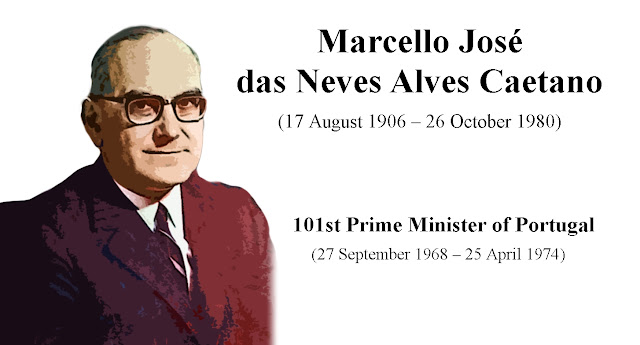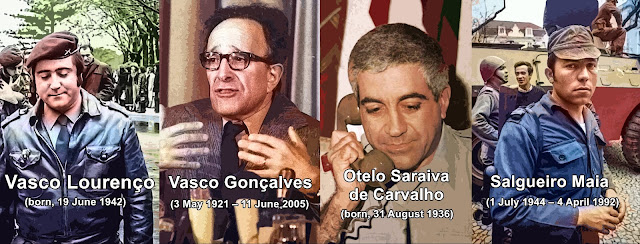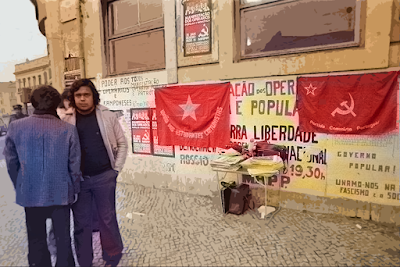 The Carnation Revolution took place in Portugal on 25 April 1974, when a group of young officers overthrew the Estado Novo dictatorship, which has been in force since 1933. Its name arose from the fact that almost no shots were fired, and the population who took the streets to celebrate the end of the dictatorship offered carnations to the soldiers, which were placed in the muzzles of guns and on the soldiers' uniforms.
The Carnation Revolution took place in Portugal on 25 April 1974, when a group of young officers overthrew the Estado Novo dictatorship, which has been in force since 1933. Its name arose from the fact that almost no shots were fired, and the population who took the streets to celebrate the end of the dictatorship offered carnations to the soldiers, which were placed in the muzzles of guns and on the soldiers' uniforms.The April Revolution initiated a process that would eventually end with the establishment of a democratic regime in Portugal and the entry into force of a new constitution in 1976.
Since 1933, Portugal had been governed by an authoritarian dictatorship, the Estado Novo or New State, which evolved from the Ditadura Nacional (National Dictatorship) set up after the 28 May
One of the driving forces that led to the Carnation Revolution was a desire to end colonization in Africa, especially in light of the violent and costly Portuguese Colonial War. The Independence movements from the Portuguese Mozambique, Portuguese Congo, Portuguese Angola, and Portuguese Guinea forced the Salazar and Caetano regimes to spend more of Portugal's budget on colonial administration and military expenditure, and the country became increasingly isolated from the rest of the world.
1926 coup d'etat. Characterized as an authoritarian government, it was a time of censorship and oppression and maintained by a “secret police” force. António de Oliveira Salazar was prime minister until 1968, when he had a stroke, and was replaced by Marcello Caetano.
Thousands of young men avoided conscription by emigrating illegally, primarily to France and the United States. In the early 1970s began the revolutionary Armed Forces Movement as an attempt to liberate Portugal from the Estado Novo regime and challenge the new military laws which would reduce the military budget and reformulate the Portuguese military.
In February 1974, Caetano decided to remove General António de Spínola from the position of Vice-Chief of the Defence Council of the Armed Forces in the face of Spínola's increasing disagreement with the promotion of military officers and the direction of Portuguese colonial policy. This occurred shortly after the publication of Spínola's book, Portugal and the Future, which expressed his political and military views of the Portuguese Colonial War.
In March, the leaders of the Armed Forces Movement decided when to overthrow the government. The coup began with the airing of Portugal’s song from the 1974 Eurovision competition, Paulo de Carvalho's "E Depois do Adeus" on 24 April at 10:55 p.m. This alerted the rebel captains and soldiers to begin the coup. The second signal came at 12:20 a.m. on 25 April, when Rádio Renascença broadcast "Grândola, Vila Morena", a song banned from Portuguese radio at that time. This was the signal for the rebels to begin to take over strategic points in the country.
At 4:20 AM the rebels broadcasts their first radio announcement. Commanders of forces loyal to the government were arrested in the morning, and their troops joined the rebels.
Despite repeated radio appeals from the rebel leaders, advising the population to stay home, thousands of Portuguese took to the streets, to support the military insurgents. A central gathering point was the Lisbon flower market, then richly stocked with carnations (which were in season). Some of the insurgents put carnations in their gun barrels, an image broadcast on television worldwide which gave the revolution its name.
Caetano found refuge in the main Lisbon military police station at the Largo do Carmo. Caetano, who surrenders at the end of the day, was demanding, however, that the power to be handed over to General Antonio de Spinola, that was not part of the Armed Forces Movement. Marcelo Caetano was flown under custody to the Madeira Islands where he stayed for a few days, before he flew for exile in Brazil.
After the coup, power was held by the National Salvation Junta. Portugal experienced a turbulent period, known as the Ongoing Revolutionary Process. One of the first acts of the new government was to end the colonial wars and negotiate Portuguese withdrawal from its African colonies. These events prompted a mass exodus of Portuguese citizens from Portugal's African territories, creating over a million Portuguese refugees – the retornados.
Spínola lasted as the first post-Revolution President from 15 May 1974 until 30 September of the same year, when he resigned after the failed coup planned by Right-wing military figures on 28 September 1974. On 25 November 1975 was a pro-communist coup, followed by a successful counter-coup by pro-democracy moderates.
The Ongoing Revolutionary Process ended after the entry into force of the new Constitution on April 25, 1976, and the first constitutional government, led by centre-left socialist Mário Soares, took office.






